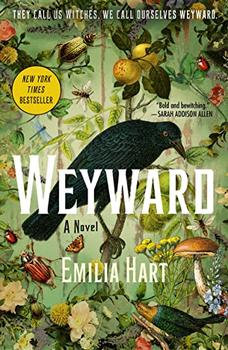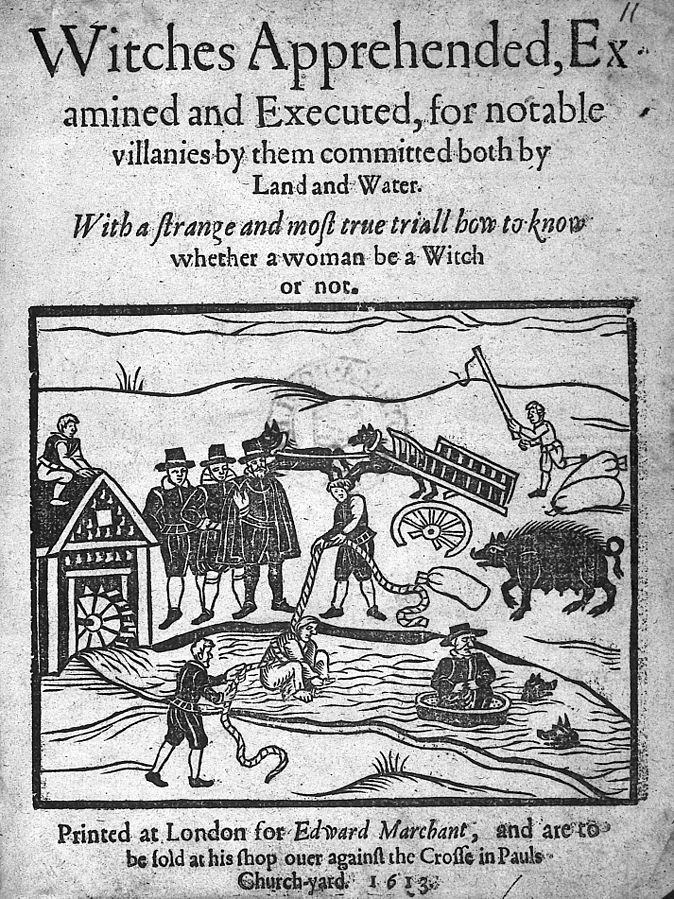Summary | Excerpt | Reading Guide | Reviews | Beyond the Book | Read-Alikes | Genres & Themes | Author Bio

A Novel
by Emilia HartThis article relates to Weyward
"Witch. The word slithers from the mouth like a serpent, drips from the tongue as thick and black as tar. We never thought of ourselves as witches, my mother and I. For this was a word invented by men, a word that brings power to those who speak it, not those it describes. A word that builds gallows and, turns breathing women into corpses."
Emilia Hart, Weyward
 At the opening of Emilia Hart's Weyward, there is a quote from Shakespeare's Macbeth regarding the three witches: "The Weyward Sisters, hand in hand/Posters of the sea and land/Thus do go, about, about/Thrice to thine/Thrice to mine/And thrice again to make up nine./ Peace, the charm's wound up." Following this quote, there is a note, stating: "'Weyward' is used in the First Folio edition of Macbeth. In later versions, 'Weyward' was replaced by 'Weird.'" Weyward is the family name of the first of the three women in Emlia Hart's Weyward. In the Prologue, set in 1619, Altha is being held in a dungeon before being taken away to trial. We soon learn that she has been accused of witchcraft.
At the opening of Emilia Hart's Weyward, there is a quote from Shakespeare's Macbeth regarding the three witches: "The Weyward Sisters, hand in hand/Posters of the sea and land/Thus do go, about, about/Thrice to thine/Thrice to mine/And thrice again to make up nine./ Peace, the charm's wound up." Following this quote, there is a note, stating: "'Weyward' is used in the First Folio edition of Macbeth. In later versions, 'Weyward' was replaced by 'Weird.'" Weyward is the family name of the first of the three women in Emlia Hart's Weyward. In the Prologue, set in 1619, Altha is being held in a dungeon before being taken away to trial. We soon learn that she has been accused of witchcraft.
In 1603, James VI of Scotland acceded to the English throne, becoming James I of England. Fascinated with witchcraft, he wrote a book in 1597 titled Daemonologie and in 1604 enacted a new law, the Act Against Conjuration, Witchcraft, and Dealing with evil and wicked Spirits. One of the most notorious trials under this law was that of the Pendle witches at Lancaster Castle in 1612. This is where, a few years later, Altha is tried in Weyward. The novel also mentions the Devices and the Whittles, the two main families involved in the Pendle witches trials.
The accusations originated with these two families, led by widows Elizabeth Southerns and Anne Whittle, who both had been known for decades as "witches" in Pendle. Healers using helpful magic was fairly normal in 16th and early 17th century England, despite the practice increasing their risk of being accused of witchcraft. Southerns lived with her daughter Elizabeth Device, and Device's children James, Alizon, and Jennet, and all were believed to practice magic. On 21st March, 1612, Alizon asked to purchase metal pins from a peddler named John Law; Law refused and Alizon cursed him. As Law walked away from her, he fell; historians believe he probably had a stroke. Law then accused Alizon of witchcraft. Alizon, believing herself responsible, asked Law for forgiveness, in effect admitting to the crime.
From there the accusations spread rapidly, between the Devices themselves and towards their rivals, the Whittles. James accused his sister Alizon of cursing a local child and Elizabeth Device accused her mother of having a "witch's mark." The presence of such a "mark", which could be any sign of deformation or moles was one of the various different ways to "identify" a witch in 17th century England. In Weyward, Altha has a mole on her ribcage just below her heart, which she inherited from her mother, and painfully scrapes off with her fingernails before she is stripped to reveal the mark during her trial.
Alizon Device then accused Anne Whittle and her daughter, Anne Redfern, of witchcraft and of murdering five men, including Alizon's father. When Elizabeth Device held a meeting at her home for family sympathizers, an inquiry was held and eight more people were arrested.
In August 1612, the accused were marched through the streets of Lancaster to be formally charged with witchcraft at an assize (a court session presided over by visiting judges from the higher courts in London), just as Altha is in Weyward.
The two widows, Elizabeth Southerns and Anne Whittle, both in their eighties and blind, confessed to being witches but Southerns died in jail before her trial began. The trials of the others accused took place shortly after. At the trials of her mother Elizabeth, her sister Alizon, and her brother James, nine-year-old Jennet Device (the name Jennet is given to Altha's mother in Weyward) was called as a witness to condemn them and seven others. Only one, Alice Grey, was found not guilty. The others were condemned to death and hanged.
The Pendle witch trials are well-documented accounts of what was, in essence, an enmity between Lancashire families that led to a terrible and tragic end. Witch hunting in England was finally abolished by the Witchcraft Act of 1735, which made accusing anyone of witchcraft to be a crime and outlawed the hunting and execution of people for being witches. According to UK Parliamentary records, around 500 people were executed for witchcraft in England between the 15th and 18th centuries.
See also Witch Trials in Elizabethan and Jacobean England.
A woodcut of witches from Cotton Mathers' Wonders of the Invisible World (1689), which was used in an 18th-century pamphlet about the Lancashire witches.
Filed under People, Eras & Events
![]() This "beyond the book article" relates to Weyward. It originally ran in April 2023 and has been updated for the
February 2024 paperback edition.
Go to magazine.
This "beyond the book article" relates to Weyward. It originally ran in April 2023 and has been updated for the
February 2024 paperback edition.
Go to magazine.
Your guide toexceptional books
BookBrowse seeks out and recommends the best in contemporary fiction and nonfiction—books that not only engage and entertain but also deepen our understanding of ourselves and the world around us.